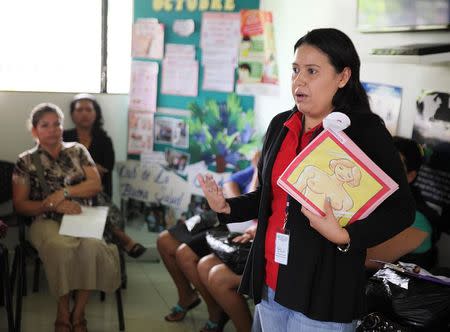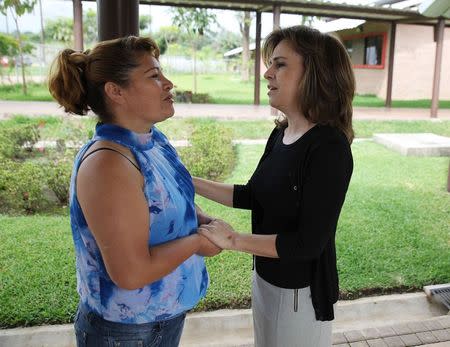Women City centres bring hope to El Salvador's abused women
By Anastasia Moloney SANTA ANA, El Salvador (Thomson Reuters Foundation) - Rosa put an end to a 20-year abusive relationship in the less than two hours it took her to file for divorce, an alimony claim and a restraining order against her husband. Such procedures usually take weeks in El Salvador. But at one of the country's "Women City" centres set up to help women break cycles of violence by making it easier for them to report abuse and get help, Rosa is already moving on with her life. At each of El Salvador's five Women City centres, 15 government agencies offer a range of services from reproductive and natal healthcare and breast cancer prevention to business advice, job training and bank loans - all under one roof. "I'm grateful to get free legal advice and be treated nicely by a female police officer who's taking me seriously," Rosa said as she waited to see a psychologist at the Women City centre in Santa Ana, an hour's drive from the capital San Salvador. "I don't have to live with the beatings anymore," Rosa told the Thomson Reuters Foundation, declining to give her full name. Since the first Women City opened in 2011 to promote women's rights, their economic empowerment and access to health services, some 603,000 women have used the centres, built in and around cities with high rates of violence against women. "Before coming to Women City, I didn't even know I had all these rights as a woman and that free help is available. It's been so easy doing everything all in the same place. And I can leave my son at the crèche here," Rosa said. SPOTLIGHT ON VIOLENCE AGAINST WOMEN Until recently, violence against women in the conservative Central America nation was seen as a private matter to be dealt with behind closed doors. But a landmark speech by former president Mauricio Funes in 2012 started to slowly change perceptions. "Violence against women is violence against society," said Funes, in what many El Salvadorans say was a watershed moment because it put the problem in the public domain. As part of its response to gender-based violence, the government launched Women City, the brainchild of Vanda Pignato, El Salvador's former first lady and Funes' estranged wife. "Before that speech women didn't exist in government policies," Pignato, now the presidential secretary for social inclusion, told the Thomson Reuters Foundation as she walked along the corridors of the Women City in Santa Ana. "They were invisible. At Women City, women are now visible, in a place that's just for them. When women come here they get a hug from a female official who doesn't judge or ignore them." In a region known for its high levels of violence against women, Women City is seen as a model other Latin American countries could adopt. Guatemala, Colombia and Mexico have all expressed interest in the UN Women-backed initiative. Yet getting the first Women City centre off the ground was met with resistance from the political elite, as well as the Catholic Church and evangelical groups. "In El Salvador, everything is dominated by men," said Brazilian-born Pignato. "Powerful and empowered women are seen as a dangerous thing for the political classes." BREAKING CYCLE OF VIOLENCE Like other Latin American countries, violence against women in El Salvador stems from a deeply macho culture, which results in a lack of economic independence and women being seen primarily as child bearers. El Salvadoran women have lower levels of education, higher school dropout rates and almost twice the rate of illiteracy compared to men. Around 40 percent of El Salvadorans are poor. "It's a problem to do with education. Women have been raised to serve men and for men to provide. So men see women as an object, just someone who serves," Pignato said. "While there's sexual violence by gang members, the main enemy for women, especially young women and girls, is sexual violence that takes place in the home," she added. In one of the buildings in the Women City, rape survivors receive legal advice, as well as medical and psychological care. Right next door to a forensic lab where semen and blood samples are collected, policewomen and public prosecutors are on hand to receive the evidence and handle criminal cases. "In the past it was the same government institutions that promoted the idea that violence against women wasn't worth investigating," said Pignato. "The government had turned their back on women. That's changing. Women City has helped regain the credibility of government institutions and recover trust lost in the system." Still, there is a long way to go. El Salvador's judicial system is notoriously corrupt, overstretched and underfunded, critics say. Rights group say around 80 percent of crimes against women go unpunished, while a culture of blaming women for the sexual abuse they have suffered still exists. ECONOMIC EMPOWERMENT Recognising the importance of economic independence, Women City also helps women to earn a living by teaching them a new trade or skill, such as shoe making, repairing boat engines and computer skills, so they depend less on men to provide for them. At an onsite vegetable farm they are also taught organic farming techniques. "It's difficult to convince a woman to report a crime especially when the aggressor is a family member and the sole provider for the family," Pignato said. At another block, a class on making traditional birthday games and decorations is in full swing. For Ana Cecilia Alas, the $20 she earns a month from selling what she produces at the workshop makes all the difference. "I use the money to ensure my sons have the textbooks and clothes they need for school," she said, putting the final touches on a papier-mâché pinata. (Reporting by Anastasia Moloney; Editing by Astrid Zweynert and Katie Nguyen)

 Yahoo News
Yahoo News 


